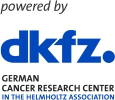Dr
Vanessa Arfelli
(Department of Medicine III, University Hospital, LMU Munich, Munich, Germany; German Cancer Consortium (DKTK), partner site Munich a partnership between DKFZ and LMU University Hospital Munich (LMU Klinikum), Germany)
ZBTB7A is a transcription factor critical for hematopoietic lineage commitment, particularly in promoting erythroid differentiation. In acute myeloid leukemia (AML), ZBTB7A mutations are frequently associated with the t(8;21) translocation, which generates the RUNX1::RUNX1T1 fusion and defines a patient subgroup with relatively favorable outcomes. However, relapse remains a significant clinical challenge, highlighting the need for novel therapeutic strategies. To investigate the cooperative role of ZBTB7A loss in RUNX1::RUNX1T1-driven leukemogenesis, we established a murine model by transplanting sub-lethally irradiated C57BL/6J mice with Cas9-EGFP bone marrow (BM) progenitors transduced with a construct encoding RUNX1::RUNX1T1 (9a variant), tdTomato, and either a Zbtb7a-targeting or non-targeting sgRNA. Strikingly, only mice receiving ZBTB7A knockout cells developed leukemia (latency: 99 days), whereas control mice remained in a preleukemic state for nearly 200 days. Leukemic mice exhibited anemia, elevated leukocyte counts, bone marrow infiltration (>20% blasts), and organomegaly. Immunophenotyping of BM double-positive EGFP and tdTomato leukemic cells revealed a predominant population lacking Sca-1, but positive for c-Kit and CD43, markers consistent with megakaryocyte-erythroid progenitor (MEP)-like leukemia-initiating cells. Besides, approximately 50% of the double-positive cells were also CD71+ and TER119–, indicating a differentiation block at the proerythroblast stage. However, within the Lin– Sca-1– c-Kit+ compartment, a typical MEP population coexisted with an aberrant CD16/32+ CD34– subset, suggesting skewing toward a granulocyte-monocyte progenitor (GMP)-like profile. Ongoing ex vivo colony-forming assays and single-cell RNA sequencing will further elucidate the nature of RUNX1::RUNX1T1 + ZBTB7A-deficient leukemia, with the ultimate goal of identifying novel therapeutic vulnerabilities associated with ZBTB7A loss.
| Research type |
Basic research
|
Dr
Vanessa Arfelli
(Department of Medicine III, University Hospital, LMU Munich, Munich, Germany; German Cancer Consortium (DKTK), partner site Munich a partnership between DKFZ and LMU University Hospital Munich (LMU Klinikum), Germany)
Dr
Monica Cusan
(Department of Medicine III, University Hospital, LMU Munich, Munich, Germany)
Kristina Herre
(Core Facility Animal Models (CAM), Biomedical Center, Ludwig-Maximilians-University, Martinsried, Germany)
Anna Jaekel
(Department of Medicine III, University Hospital, LMU Munich, Munich, Germany)
Paulina Uhl
(Department of Medicine III, University Hospital, LMU Munich, Munich, Germany)
Simona Di Gaetano
(Department of Medicine III, University Hospital, LMU Munich, Munich, Germany)
Dr
Sonja Fiedler
(Institute of Veterinary Pathology at the Center for Clinical Veterinary Medicine, Ludwig-Maximilians-Universität München, Munich, Germany)
Dr
Enric Redondo Monte
(Department of Medicine III, University Hospital, LMU Munich, Munich, Germany)
Dr
Anja Fischer
(Institute of Molecular Oncology and Functional Genomics, School of Medicine, Technische Universität München, Munich, Germany; German Cancer Consortium (DKTK), partner site Munich a partnership between DKFZ and TUM University Hospital (TUM Klinikum),Germany)
Prof.
Roland Rad
(Institute of Molecular Oncology and Functional Genomics, School of Medicine, Technische Universität München, Munich, Germany; German Cancer Consortium (DKTK), partner site Munich a partnership between DKFZ and TUM University Hospital (TUM Klinikum),Germany)
Prof.
Lesca M. Holdt
(Institute of Laboratory Medicine, Laboratory of Clinical Studies, University Hospital, LMU Munich, Munich, Germany)
Prof.
Andreas Blutke
(Institute of Veterinary Pathology at the Center for Clinical Veterinary Medicine, Ludwig-Maximilians-Universität München, Munich, Germany)
Dr
Bastian Popper
(Core Facility Animal Models (CAM), Biomedical Center, Ludwig-Maximilians-University, Martinsried, Germany)
Prof.
Christian Wichmann
(Department of Transfusion Medicine, Cell Therapeutics and Haemostaseology, University Hospital, LMU Munich, Munich, Germany)
Prof.
Philipp A. Greif
(Department of Medicine III, University Hospital, LMU Munich, Munich, Germany; German Cancer Consortium (DKTK), partner site Munich a partnership between DKFZ and LMU University Hospital Munich (LMU Klinikum), Germany)
There are no materials yet.

